‘We Petition to You to Remove Them from Amongst Us’: Highlights from Native American Tribal Histories
As U.S. settlers pushed farther west, Native Americans were confined to increasingly small parcels of land which restricted their autonomy, impacted their cultures and traditions, and led to numerous conflicts. Through much of this period the education, land rights, treaty negotiations, commerce and trade, and other affairs of the many Native American tribes were overseen by a cadre of regional superintendents from the federal Bureau of Indian Affairs and their agents who worked directly with tribal leaders, settlers, and traders. These administrators scrupulously recorded their interactions with Native American tribes, instructions from Congress, directives to their agents, and materials received from private citizens, traders, missionaries, and tribal leaders leaving behind an astoundingly detailed archive.
In August 1872, Chairman of the House Appropriations Committee and future President James Garfield wrote to Montana Superintendent Jasper Viall authorizing actions to relocate the Flathead tribe to a reservation:
Dear Sir,
In carrying out the terms of the contract made with the Chiefs of the Flatheads for removing that tribe to the Reservation, I have concluded after full consultation to proceed with the work in the same manner as though Charlot the first Chief had signed the contract. I do this in the belief that when he sees the work actually going forward, he will conclude to come here with the other chiefs and thus keep the tribe unbroken.
I therefore authorize you to commence immediately the building of twenty houses on the grounds adjoining the agency mill and the upper wheat field and that the additional houses called for in the contract be erected as rapidly as the work can be done well, and as the necessities of the tribe shall require.

Garfield continues, describing in detail the dimensions of the houses to be built as well as the materials to be used, before concluding his letter, writing:
You are familiar with the terms of the contract made with the chiefs, I desire that you shall cause it to be carried out scrupulously in all all [sic] respect. Please report frequently the progress you are making in preparing for the removal of the tribe.
An 1839 letter from the Western Superintendent, William Armstrong, to Commissioner Thomas Hartley Crawford refers to another authorization from Congress, in this case for vaccines.
Sir,
An appropriation was made at the last session of Congress of $5000 for the vaccination of Indians. Of this sum $1500 will be allowed for the expense that may be incurred for this purpose in your superintendency. Vaccine matter will be sent to you as soon as it can be procured. You will please to give the Agents and Subagents the requisite instructions to ensure the prompt ministering of relief wherever it may be needed.
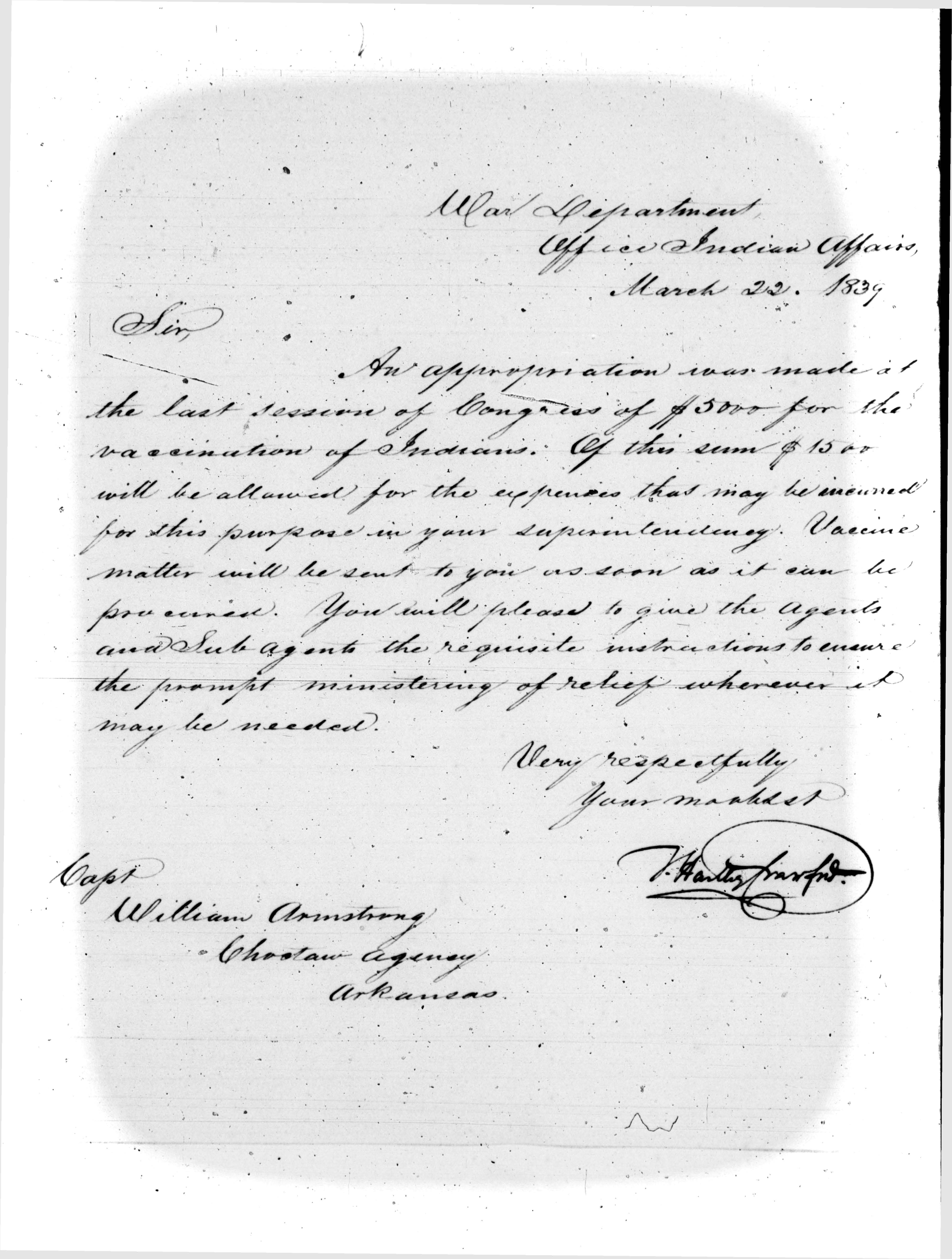
Vaccinations are also the subject of a brief note from the physician for the Crow forwarded to the Montana Superintendency by Crow Agent Camp.
General,
I have the honor to request that vaccine virus of good quality be furnished for vaccination of Indians and employees of this agency.
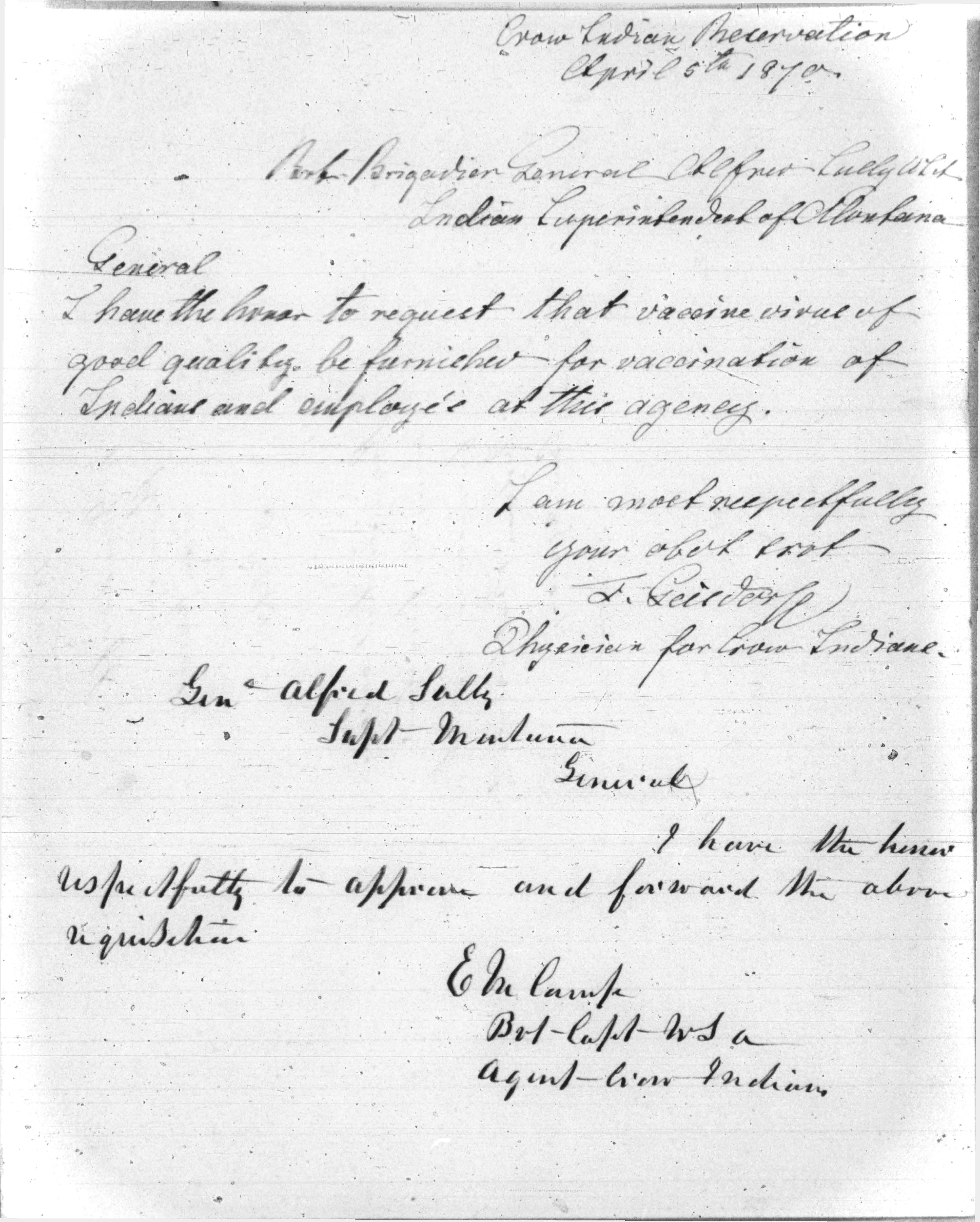
In addition to quantifiable responsibilities such as constructing housing and administering healthcare, superintendents and agents were also charged with managing the relationships between settlers and the Native Americans. To that end, the Utah Superintendent implores a judge of the Utah Territory to investigate a murder committed within their territory.
Sir,
I have just been informed that an Indian who had been wounded and taken prisoner and who was in confinement at [illegible] in your county was a few days since killed, in prison such an offence can be regarded in no other light than as a deliberate murder, and that too, under circumstances of great barbarity, rivaling in that respect the worst acts of the Indians themselves. Such acts can but have the most unfortunate effects upon the efforts which are being made by the Government to promote and perpetuate friendly relations with the Indian tribes.
I would therefore respectfully request that, in your official capacity, you spare no effort to discover the perpetrator of this outrage and to procure his speedy arrest and trial. By such a course alone can the Indians be convinced that the act was not the act of the community but of [illegible] misguided person whose criminal conduct [illegible] meets the punishments.
Very respectfully yours,
F.H. Head
Sup. Ind. Affairs
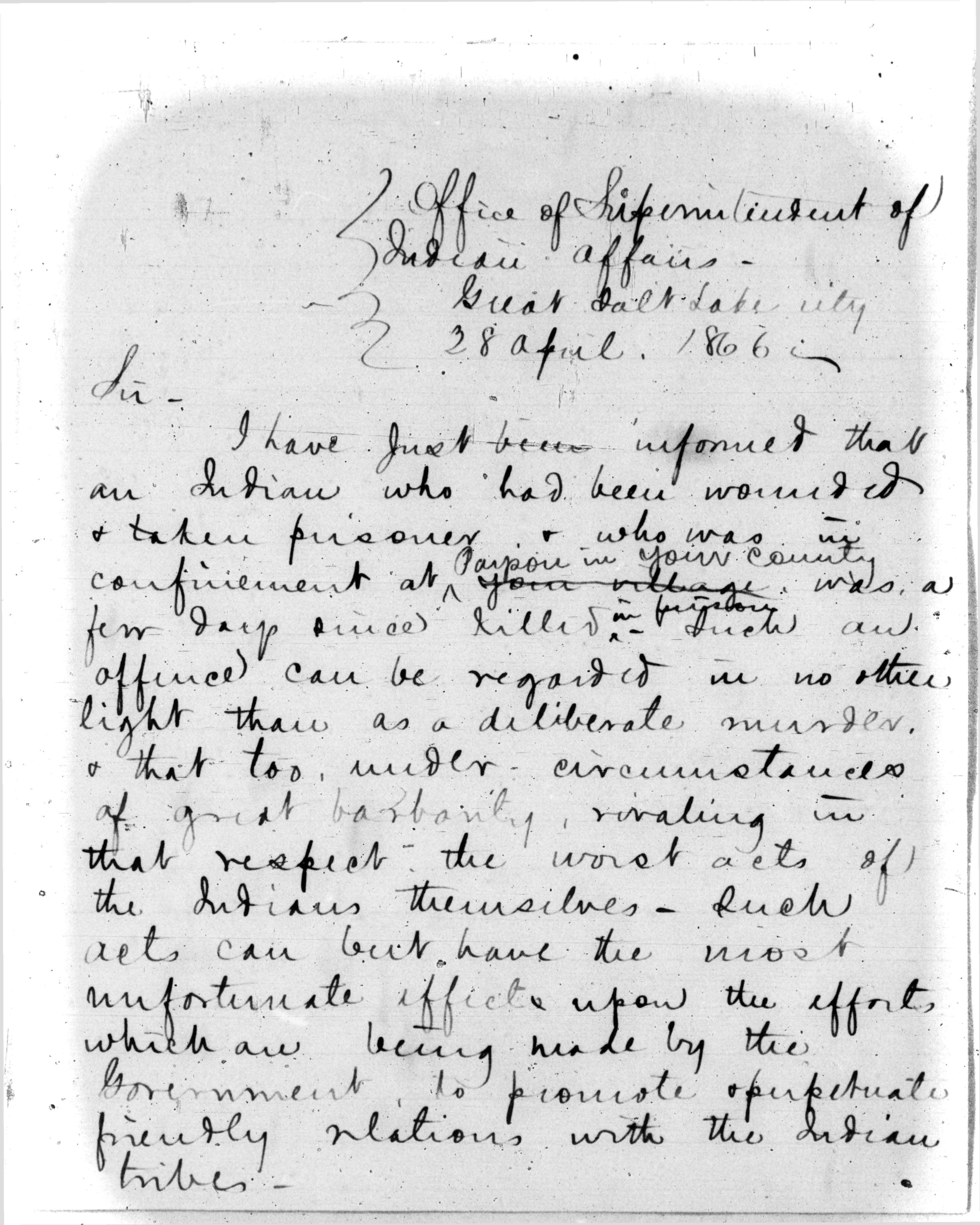
Similarly, when acts of violence were committed against settlers it was the agents’ responsibility to investigate and report the findings to their superiors. To that end, Crow Agent Pease, in his 1872 letter to Commissioner Walker, writes:
Sir,
I have the honor to inform you that on Sunday the 20th inst. A white man by the name of James Banks was murdered by some Indians unknown to me, at a point on Skull Creek, about ten miles south of Crow Agency. It is supposed that the Indians murdered him for the purpose of obtaining four horses, which were in his possession at the time he was shot. There was another white man in the vicinity, who saw the Indians that committed the murder; but was not near enough to them to distinguish what tribe they belong to. On the day before the murder some fifty lodges of Bannock and Snake Indians passed through here, and over into the Gallatin Valley, a number of whom were seen coming back towards the Yellow Stone for the supposed intention of stealing horses. It is my opinion that this party, or a portion of them are the guilty parties, but of course this is only speculation. Some two weeks since a Bannock Indian, who had stolen nine horses from some white men, was followed and overtaken in the Gallatin Valley, and killed, and his circumstances strengthens my suspicions that the Bannocks killed Banks. I immediately sent information to Maj. E.M. Baker comdy at Fort Ellis, acquainting him with the facts; who dispatched Lieut. McClernand [sp?] in command of fifteen men for this Agency, when they arrived last evening. They have gone today to look after the trail, and if possible discover who the guilty parties are. There exists among the citizens in this vicinity quite a strong feeling against the Crows on account of the raid of some Indians in the Gallatin Valley last season, and there is quite a strong impression among the settlers that the Crows committed this last outrage. On this account I have determined to give this matter a thorough investigation; and have taken the responsibility of hiring six men who are well acquainted with the country, as well as Indian habits, to visit the Camps of different tribes and gain all the information possible. The expense will be four dollars per day for each man; and the time of service from ten to twenty days each. I will estimate for these expenses soon as I know what they amount to and earnestly hope that the necessity of immediate action this case will entitle my estimate to a favorable consideration.
Very Respectfully
Your Obedient Servant
F.D. Pease
Agent for the Crow Indians
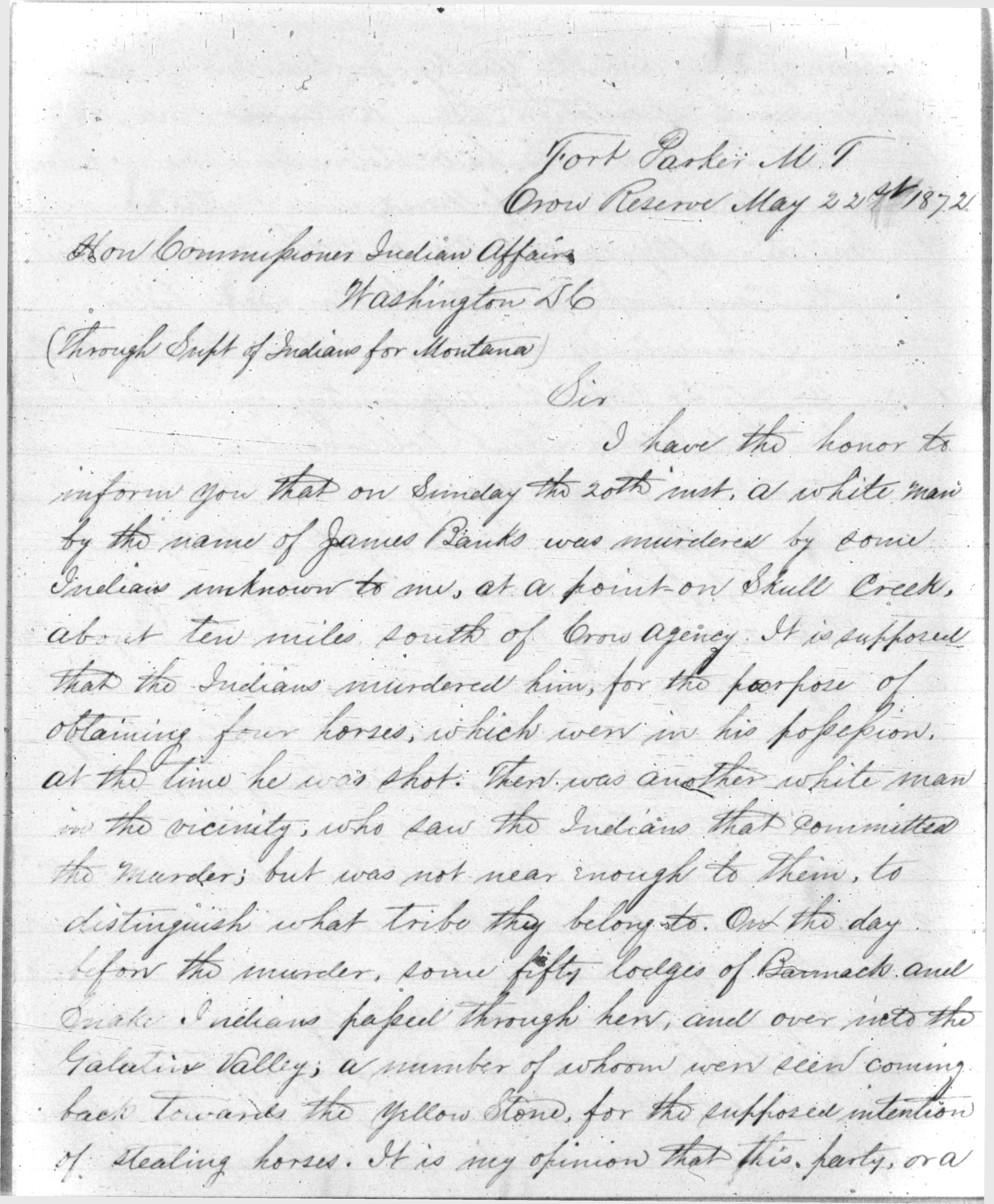
Agents themselves were also the subject of reports, such as this memorial from the employees of the Uintah Valley Indian Agency in the Utah Superintendency. Describing their displeasure with Agent George Graffam, the employees seek the advice of Superintendent Tourtellotte.
We the undersigned, being laborers at the Uintah Indian Agency, and all of us being very much dissatisfied at the way in which business has been transacted here, during the last seven months, think it highly necessary that you, as the head of the Department, should be informed of the same. We have none of us received any pay, or part payment, for the space of seven months. And moreover we hear that Agent G.W. Graffam is using money at Fort Bridger at this present time that we have good reason to believe was put in his hands for the payments of the men now employed at this agency and also that there is no excuse whatever for his staying there, as men have crossed the mountains nearly two weeks ago, and he was then at Fort Bridger. Some of the men are going out again now, and by them I sent this letter. The Indians are also very much dissatisfied and with the exception of the old men around the Agency are inclined to be hostile. We have been steady at work all spring, when it was safe to do so. The wheat is now about all sown and other land in proportion is broken up. We think it necessary also to inform you that provisions are getting very scarce. There is not provisions enough in the place to last six weeks longer, and under these circumstances, we wish to know what we are to do. To you sir as head of the Department we naturally look to you for advice.
Following the employees’ signatures is this post script:
Since writing the above the cook has informed me that I was wrong in my statement of the provisions. He informs me the flour will not last with the most careful usage, more than a month, and also the tea and coffee will not last more than ten days. Salt we have none.
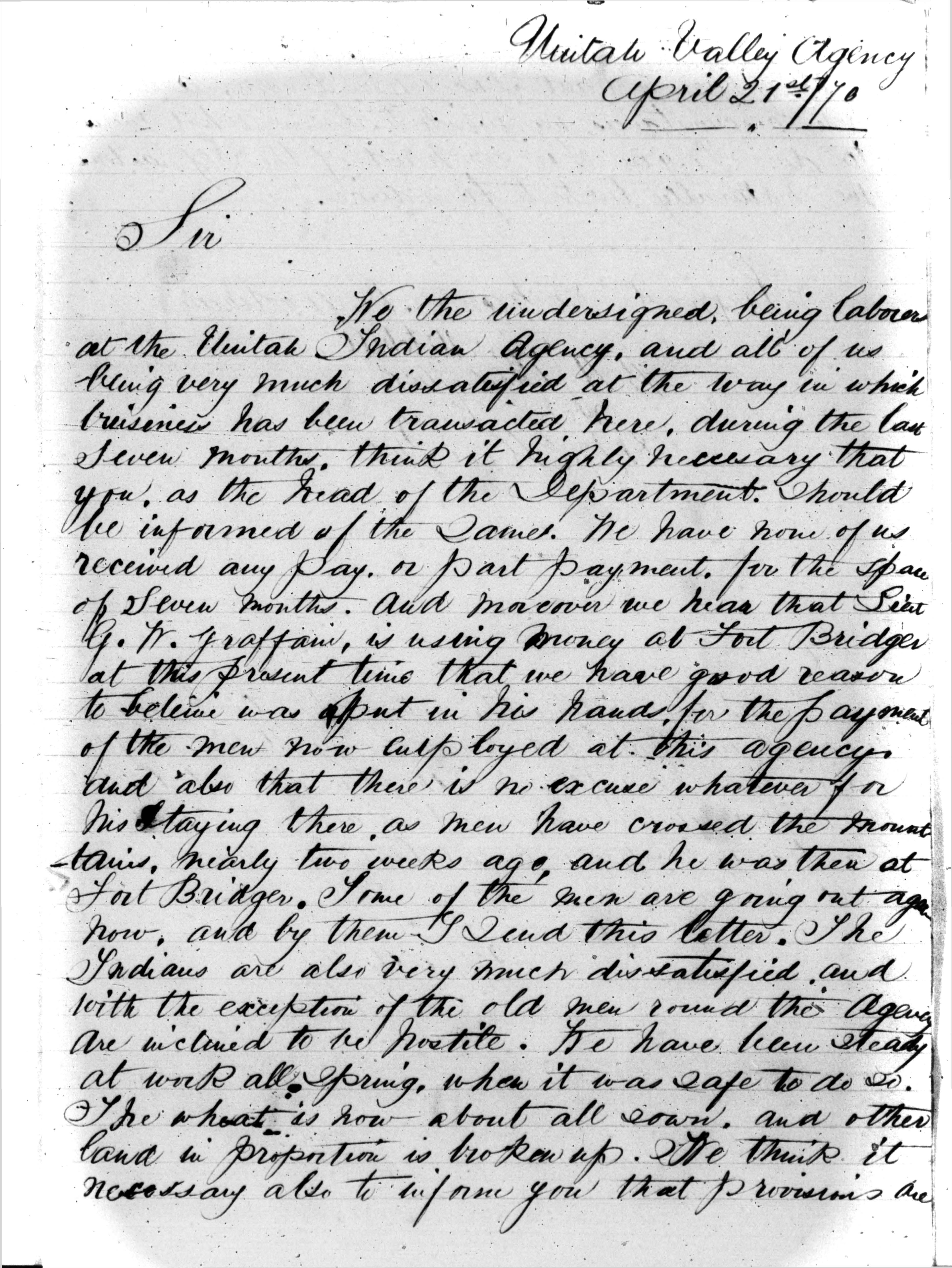
Nor were the superintendents above reproach. In an affidavit describing the accounts of Superintendent Jacob Forney, Robert Hereford attested to the following:
That between the 10th and 18th days of May, last past, Doct. Jacob Forney, requested me to call upon Mr. P.K. Watson, principal agent of Hockaday & Burr, merchants of Salt Lake City, U.T. and to ask permission of him, to examine his, the said Forney’s accounts with the said firm, which privilege was granted me, I examined the books of the said Hockaday and Burr in company with Mr. Watson, and found that the accounts were all settled, and correct.
Afterwards in conversation with Mr. Watson he remarked, that Doctor Forney had purchased one keg of whiskey and had it charged to him, the said Forney, as blankets, remarking that he did not like to have whiskey charged in his bill.
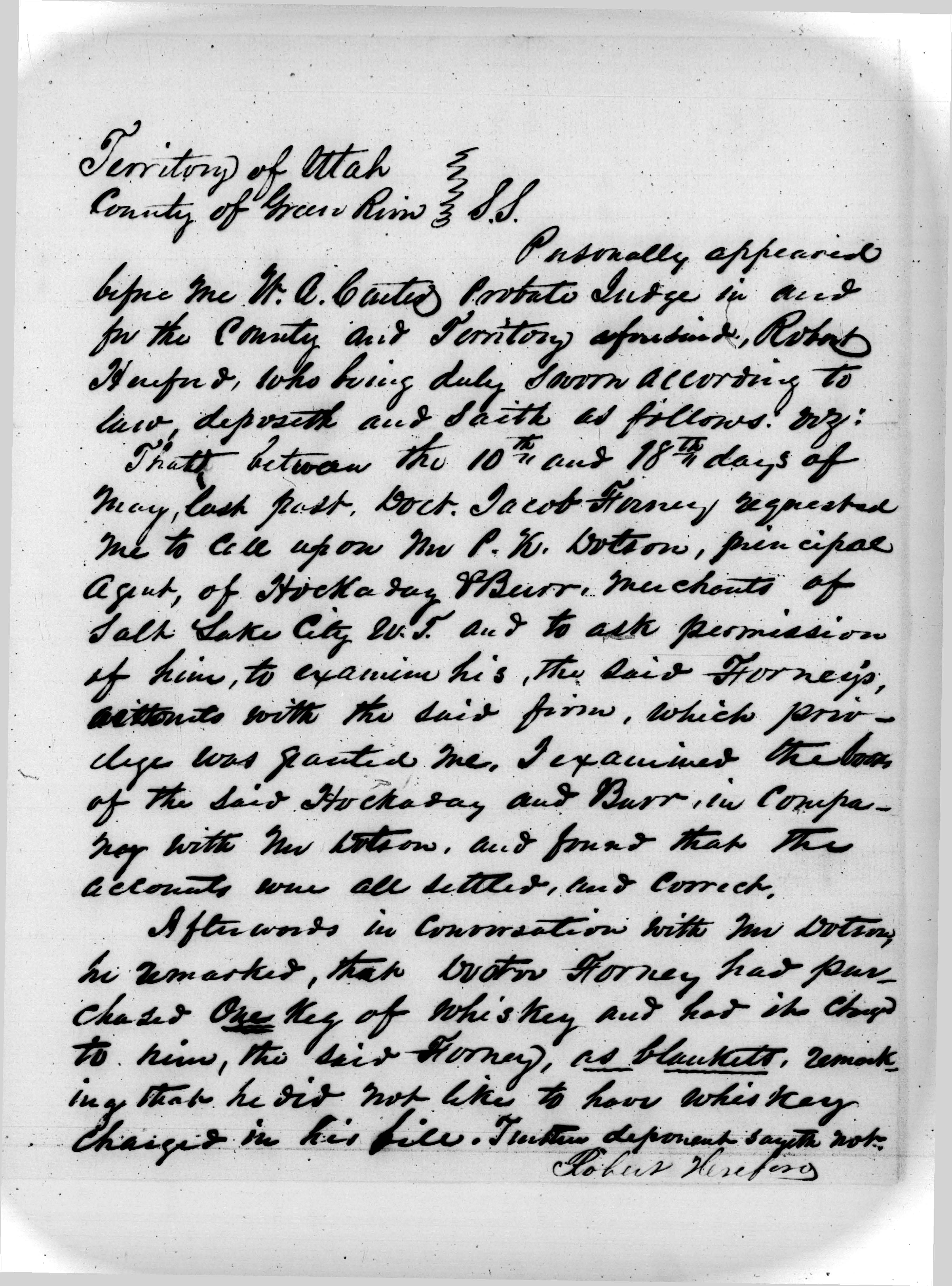
Another source of material found in this collection is correspondence from missionaries such as Camillus Imoda, who on April 11, 1870 sent the following report to Montana Superintendent Alfred Sully:
Dear Sir,
I have the pleasure to inform you, that having been on a visit to the Indian camps on Belly River in the British possessions, there I met a large camp of Piegans, most of whom were those that fled from the Marias after their misfortune of January last.
Being called by the Mountain Chief in his lodge, he spoke at length of their late misfortune and at the desire he and his people have of making now a lasting peace with the whites.
Having told him that I was glad to hear what he said; but desired to know if the other chiefs were of the same mind. We arranged to have a meeting of them, which was held on the 17th of March. And it is from notes taken on the spot that I have the honor to report to you the expression of their wills.
The Mountain Chief complained of the false report of his having declared war to the whites as in the Gazette of the 1st February. He strongly denied to have said anything that could be so understood. He said he had been stripped of his lodge and made poor. But he is satisfied that his young men have been beaten, and thinks that now they will mind their chiefs and not go anymore to trouble the whites. He denies now to make with them a good and lasting peace.
Aissaka, chief of the band of the Fried grease complained, that while he has always been friend with the whites his band suffered more than the others from the whites. Notwithstanding he was not ill disposed towards them and desired that a lasting friendship should be established again.
The Boy Chief said, that it was his desire that the past be forgotten, and that a good peace be made with the whites. He complained of the Pend d’Orelle and denies that the whites will exercise their influence to bring them to make a lasting peace with the Piegans.
Stoaepi of the Lame Bull’s band says: that his family has been nearly extinguished in the late fight. But he will not talk bad, and desires to make peace. He fears that the Mont. Blackfeet might steal again from the whites and that the blame might be put on the Piegans.
The White Calf, Generous Woman, Cut Head, and Big Talk chiefs of different bands of Piegans were also present and spoke but theirs being but a repetition of the proceeding, I think that the above be enough to persuade you of their general desire to make a lasting peace with the whites.
In the hope that such a thing be soon accomplished I remain,
Very Respectfully,
Your Obedient Servant
C. Imoda
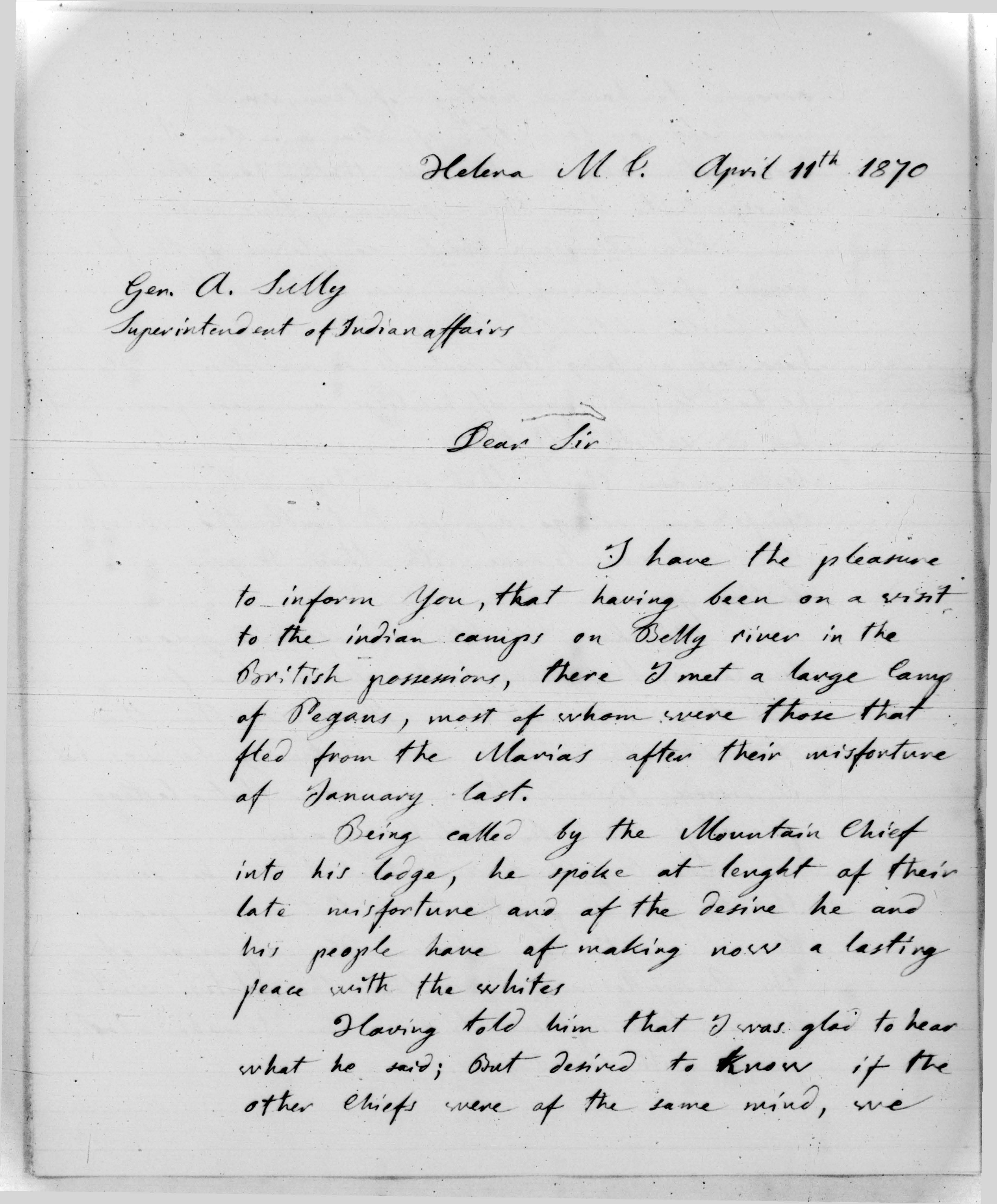
However, not all missionaries were well received. In some cases, tribal leaders even petitioned for their removal.
Dear Sir,
The intercourse law with our nation and the United States prohibiting White persons who are residing, or tarrying amongst us, who without our knowledge have any connection with any of our Natives (by marriage or intercourse shall leave the nation and if they shall leave any children, all property appertaining to the father shall remain for the support of the children.
The object of us writing is in regard to the Missionaries. The long experience of their being amongst us has proven to be of the most serious nature, both as to nation and private individual, as an instance they are encouraging our slaves, by teaching them, and telling them that they should be free, and another the Rev. John Irvin who is or has been teaching school and preaching at Mr. Hardrage’s and at other places in the nation has by his strong intellect imposed himself on one of our most respectable women, and seduced her to his diabolical passion and now is laboring in a state of pregnancy by him.
And under these circumstances we petition to you to remove them from amongst us as soon as possible and further beg that you will lay a copy of this petition before the Board of Missionaries.
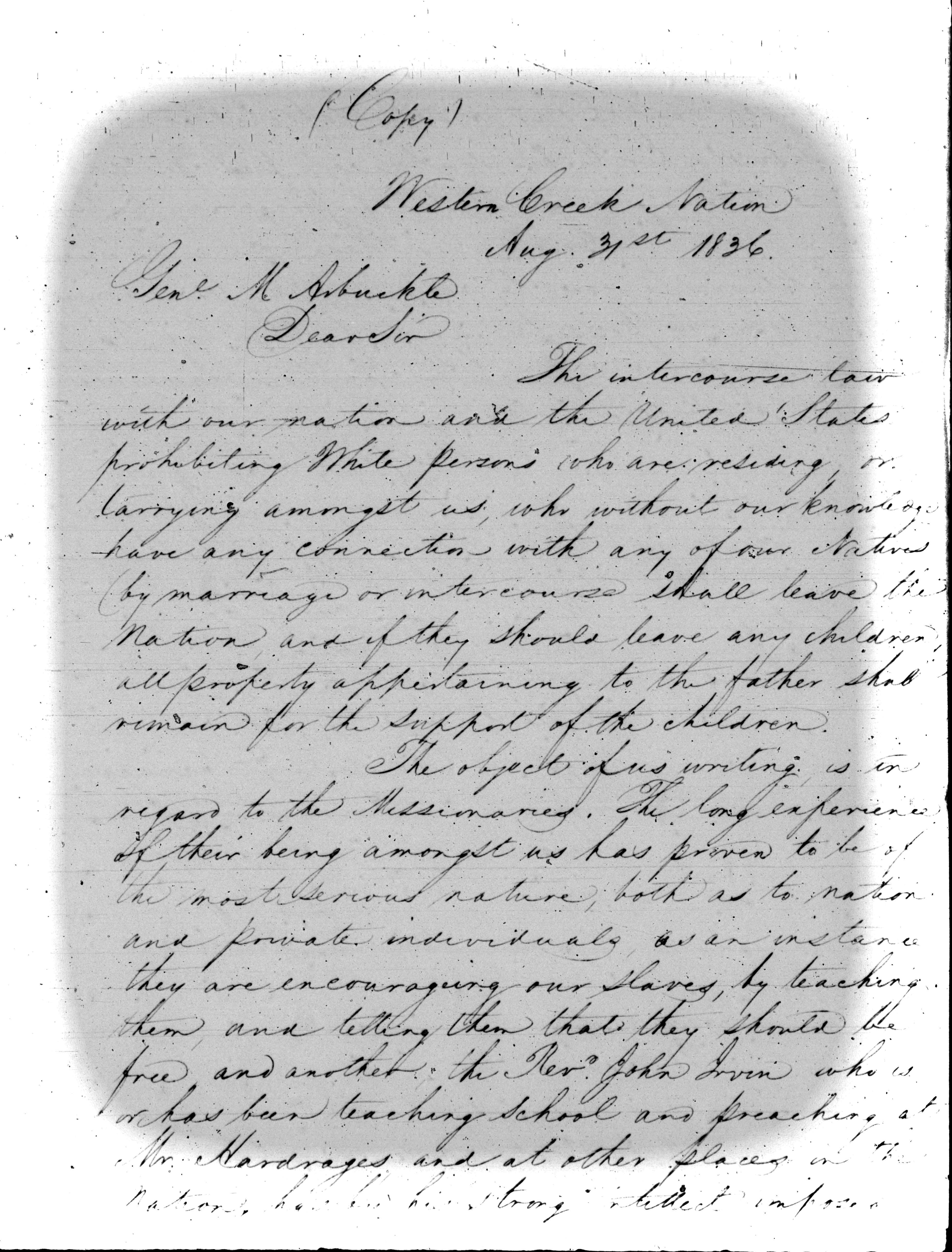
Visit the Readex Native American Studies page for information on this collection and more.



